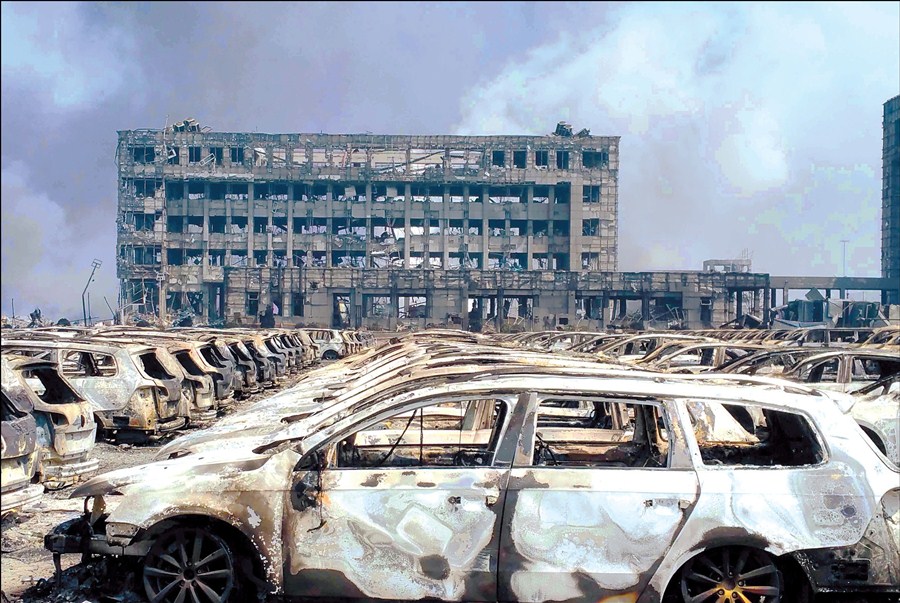Warehouse was designed to store toxic chemicals
 0 Comment(s)
0 Comment(s) Print
Print E-mail Shanghai Daily, August 14, 2015
E-mail Shanghai Daily, August 14, 2015
Two huge explosions tore through an industrial area where toxic chemicals and gas were stored in the northern Chinese port city of Tianjin, killing at least 50 people, including at least 17 firefighters.
 |
|
Burned-out cars lie in neat rows near the site of two huge explosions at the Binhai New Area in Tianjin. [Photo/Xinhua] |
The Tianjin Port Group Co said dozens of its employees were unaccounted for and a search operation is underway.
Meanwhile, 701 others have been admitted to hospital, with more than 70 of them in a critical condition, according to city officials.
Wednesday night's blasts, so large that they were seen by satellites in space, sent shockwaves through apartment blocks several kilometers away in the city of 15 million people.
Internet videos showed fireballs shooting into the sky and the US Geological Survey registered the blasts as seismic events.
Vast areas of the port — the 10th largest in the world — were devastated. Crumpled shipping containers were thrown around like matchsticks, thousands of new cars were torched and port buildings left as burnt-out shells.
"I was sleeping when our windows and doors suddenly shook as we heard explosions outside. I first thought it was an earthquake," Guan Xiang, who lives 7 kilometers away from the blast site, told Reuters.
Guan, 24, said he saw flames and a mushroom cloud in the sky as he and other residents scrambled to get out of the building.
The cause of the blasts was being investigated but Xinhua news agency said several containers caught fire beforehand.
The Binhai New Area where the explosions happened is a giant logistics hub more than twice the size of Hong Kong.
It hosts auto plants, aircraft assembly lines, oil refineries and other service and production facilities.
The area is home to one of the world's fastest supercomputers, which was shut down as a precaution after Wednesday night's huge blasts.
Operations at the port were "basically paralysed" by the blast, the China Securities Journal reported.
The Beijing News earlier cited Tianjin fire authorities as saying they had lost contact with 36 firefighters. By late afternoon, Xinhua reported 18 were missing, while 66 were among the hundreds of people being treated in nearby hospitals.
Xinhua said 1,000 firefighters and more than 140 fire engines were struggling to contain a blaze in a warehouse that held "dangerous goods."
"The volatility of the goods means the fire is especially unpredictable and dangerous to approach," Xinhua said.
Several fire trucks had been destroyed and nearby firefighters wept as they worked to extinguish flames, the Beijing News reported.
President Xi Jinping demanded that authorities "make full effort to rescue and treat the injured and ensure the safety of people and their property."
Xi said that those responsible should be "severely handled."
Anxious residents rushed to hospitals to seek news about injured loved ones. Pictures online showed residents and workers, some bleeding, fleeing their homes.
Xinhua said people had been hurt by broken glass and other flying debris. Authorities told reporters they expected the blasts to have forced 6,000 people from their homes by nightfall.
Grey clouds of smoke billowed above the blast site and several trucks carrying paramilitary police — wearing masks to protect them from potentially toxic smoke — headed to the area.
The blasts shattered windows in buildings and cars and knocked down walls within a 2 kilometer radius around the site.
Video posted on YouTube from what appeared to be an apartment building some distance from the scene showed an initial blast followed by a second, much bigger, explosion. Shockwaves hit the building seconds later.
Despite the devastation, the port was operating normally, a port official said. Tianjin is the gateway to northern China's industrial belt.
Xinhua said the explosions, the first equivalent to 3 tons of TNT and the second to 21 tons of TNT, ripped through the warehouse.
A team from the International Atomic Energy Agency's Beijing environmental emergency response center, as well as 214 Chinese military nuclear and biochemical materials specialists, had gone to Tianjin, the news agency said.
It identified the owner of the warehouse as Tianjin Dongjiang Port Ruihai International Logistics. The company's website said it was a government-approved firm specializing in handling "dangerous goods."
According to an assessment by government environmental inspectors published in 2014, the facility was designed to store several dangerous and toxic chemicals including butanone, an explosive industrial solvent, sodium cyanide and compressed natural gas.
CCTV said at least one person at a "relevant company" had been detained.
About 2 kilometers from the explosion site the luxury Fifth Avenue apartment complex had all its windows blown out, and some of its surfaces were scorched, The Associated Press reported
"It's lucky no one had moved in," said a worker on the site. "But for us it's a total loss. Two years of hard work down the drain."
"It had been all quiet, then the sky just lit up brighter than day and it looked like a fireworks show," said another worker at the site.






Go to Forum >>0 Comment(s)